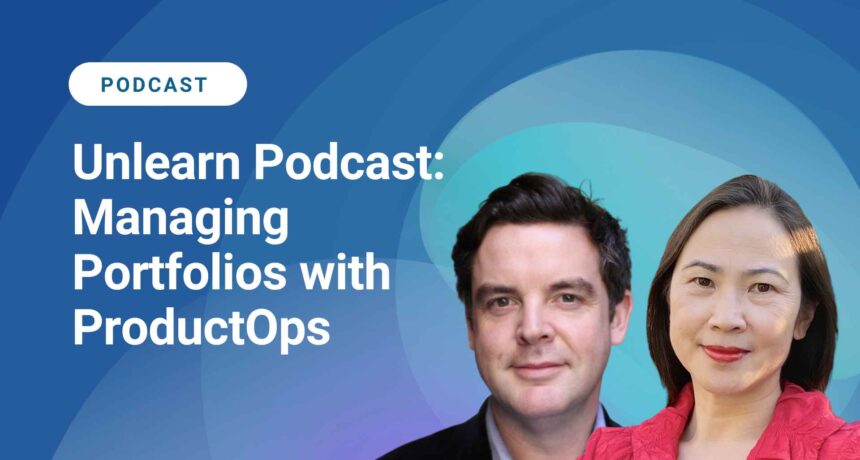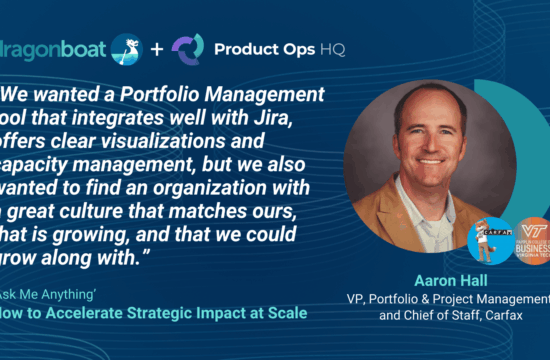You should always have a portfolio. A portfolio provides a story of where you want to go, all your challenges and conflicting goals, and competing opportunities and strategies.
But, what’s the key to effectively managing portfolios with product ops and all the moving pieces?
Our founder and CEO, Becky Flint joined Barry O’Reilly on the Unlearn podcast to discuss all the learnings and unlearning of portfolio management, and the rising shift to becoming outcome-focused.
Here are some highlights from the podcast:
- Becky’s journey from a medical background to product to entrepreneurship
- Tying business outcomes, product strategy, execution, and resourcing together
- Managing product portfolios with an outcome-focused approach
- What’s changing the game in portfolio management
Listen to the Episode Here:
Learning and Unlearning
Becky has been learning and unlearning her whole life. She had a pivotal life change when she moved to the US to study business. Coming from a medical background, meant unlearning practically everything she learned. Eventually, after earning her MBA in Finance, she worked in the tech industry for some time before finding her place in the product world.
When asked what gave her the confidence and bravery to step outside of her comfort zone, Becky shared, “The number one factor, is confidence in yourself. A lot of people are unwilling to give up what they have today. There are a lot of ‘what ifs’. Having confidence in yourself, knowing that you have the skill sets to learn, and building on top of what you already know is key. Instead of fear, you can have hope.”
How Dragonboat was Born
During Becky’s time at PayPal, she came to realize that the traditional methods and ways of product planning and strategy weren’t working.
“Our company plan was ‘perfect’. Everything fit together. But, when we looked at delivery, 80% of the work was happening over 1.5 quarters. So our plan definitely didn’t work. We had to build a new way” Becky shared.
Through taking her understanding of product management and baking in her finance learnings, Becky built the skeleton of portfolio management at Paypal as a way forward.
A bunch of other companies later, she quickly recognized that the same challenge was everywhere. Data revealed business outcomes, product strategy and execution, and resourcing weren’t properly communicated, and there was a lack of visibility and connection between teams.
This is how and why Dragonboat was born, in hopes of filling in those gaps and aligning the product vision with goals, strategy, and team execution.
“The missing piece is putting everything together. The core of the product portfolio management is that middle engine” Becky said.
The Outcomes Over Outputs Debate
“One of the biggest debates at the moment is the notion of becoming more outcome-focused. People are saying outcomes over outputs. It rolls off the tongue fantastic, but it’s actually very difficult to do, and a huge change in the way most people are managing their work,” Barry expressed.
Most people are primarily focused on output-based measures of success, such as being on time and on budget.
The shift to outcome-focused comes from the idea that every function of the company is responsible for outcomes.
If you are in sales, you are measured on revenue. Marketing is measured on leads. CSM is measured on retention. Every role becomes outcome-focused because nobody can micromanage knowledge work anymore.
“Output focus really came from the industry era. The executive would make all the calls and the team would just do what they were told. However then we realized the executive doesn’t know everything. They don’t have the latest information, so they have to rely on the team to stay competitive,” Becky explains. “If you have to rely on the team, how do you know your team is doing a good job? How do you make them successful? You have to give them the ability to measure their success.”
Driving Outcomes with Dragonboat
You can make choices and go after things with clarity if you’ve set up a good system to measure the choices you make.
Dragonboat was purpose-built to help drive outcomes, making it easier to measure and model the decisions being made, so you can see how they are performing based on the desired outcomes.
“When you measure outputs, people can execute for 2 years. If you measure outcomes, you can execute and learn quicker,” Barry says.
Becky adds, “Outcome-focused is looking across your portfolio, seeing where you want to go, with all your challenges, conflicting goals, and competing opportunities and strategies. Then, how to best put them together, with a timeframe in place, so you can adjust as you learn.”
The Future of Product Portfolio Management
When people can see what’s going on, they can make better decisions.
“With 11 teams communicating what they are doing with each other, then rolling it up, and sharing resources on who’s working on what… you can spend an entire week synthesizing that information,” Barry says. “But people are busy and don’t have time.”
Dragonboat provides visibility and acts as the source of truth for all things product, letting a tool do the work of managing and moving priorities.
Becky has brought product portfolio management to life with a tool that creates alignment across the portfolio in every aspect. This spans from visibility to goals to execution and planning, ultimately helping drive business outcomes.
“What I’m most excited to see is the trend moving from the output-focused command and control to the outcome-focused empowerment,” Becky notes. “I really believe you need alignment to be able to empower your team.”




